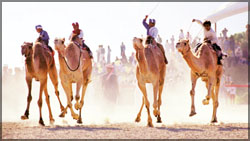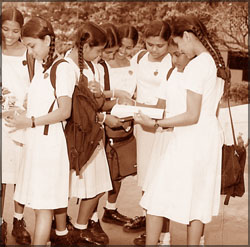|
observer |
|
|
|
|
|
OTHER LINKS |

|

|

|
|
|
|
|
The co-operative system, which is to be jointly implemented by the Co-operative Development Ministry and the Education Ministry, is yet another such initiative.
Accordingly, arrangements will be made to establish and develop the co-operative system as a new approach in schools. Education Ministry sources described the goals of the programme as cultivating social values which are gradually vanishing from society and teaching the younger generation to associate with each other in co-operation.
The assistance of the Co-operative Development Officers will be provided to the Provincial Education Directors to ensure the smooth operation of the programme. The Co-operative Development Ministry and its subsidiary institutes will also lend their support to the Education Ministry to further this goal.
Bacteria don't follow '5-second-rule'
New questions have been raised about the "5-second-rule" regarding the safety of picking up dropped food before bacteria latches on to it.
The first attempt to verify or debunk the theory was done three years ago by US high school senior Jillian Clarke during a six-week internship in the food science and nutrition department at the University of Illinois at Urbana Champaign.
No wet foods were used in the experiment - just cookies and gummi bears, and they did pick up bacteria before five seconds had elapsed.Clarke's work was supervised by Meredith Agle, then a doctoral candidate.
She told WebMD she still uses the 5-second-rule."I still pick up food off the floor," she said, "but I'm not in the susceptible (easily affected) population," referring to the high risk of infection among the very young, elderly or those with compromised (exposed) immune systems.
Clarke also conducted a survey in which people said they are more likely to eat dropped cookies and candy than dropped broccoli and cauliflower.
First tsunami warning centre set up
There has been a lot of talk about the setting up of tsunami warning centres after the December 26, 2004 tsunami which led to death and destruction on a massive scale. The first of 100 such coastal early warning towers was installed recently, on the second anniversary of the Boxing Day tsunami.
The tower came up at Hikkaduwa, a popular tourist area that faced a lot of damages in the tsunami. The 11.5-metre steel tower will have 16 loud-speakers connected by telephone with the country's main disaster management centre in Colombo. In case of a looming disaster, these loud-speakers will broadcast warnings.
The planned warning towers will be used not only to warn about tsunamis, but also for other disasters, such as floods and landslides.
The opening of the tower coincided with the National Safety Day, an effort launched by the government to promote safety by educating people about disasters.
Rehabilitating former child jockeys
You may have heard of the issue of child jockeys. Although this doesn't happen in Sri Lanka, it was widely prevalent in some Middle Eastern countries where children forcibly brought in from poor countries were forced to perform as camel jockeys during camel races. Not long ago, there were reports of many Sri Lankan children too being abducted to perform in these countries as camel jockeys.
The United Arab Emirates recently made the announcement that it has set aside more than eight million dollars for the rehabilitation of such children, under an accord with the UN children's fund, UNICEF.
 |
The UAE Government has allocated 30 million dirhams (8.3 million dollars) "to assure that all underage jockeys who were employed in the UAE receive salaries and severance compensation," an official statement said.
Most cases involve children from Pakistan, Bangladesh and Sri Lanka.
It said the funds would also be used "for health care, education and other services as appropriate through partners in their home communities" over a two-year period to allow their reintegration into the family and society.
More than 1,000 underage camel jockeys have been repatriated since an accord was signed with UNICEF in May 2005 that has been extended to May 2009, according to the statement.
The accord banned the use of children under 16 or weighing less than 45 kilograms (100 pounds) for camel racing, a national sport in the oil-rich Gulf states. The UAE now plans to use robots to race camels rather than children.
European scientists to launch "planet hunter"
Paris, France: A French-led satellite project will be launched to seek out new Earth-like planets beyond the solar system and to explore the interior of stars, the European Space Agency (ESA) said.
The COROT project will send into orbit a telescope capable of detecting planets smaller than is currently known - some maybe just a few times the size of Earth and rocky, rather than the larger, gaseous types, ESA said.
"COROT will be able to find extra-solar planets of all sizes and natures, contrary to what we can do from the ground at the moment," Claude Catala, one of the researchers associated with the project, told France Info radio.
"We expect to obtain a better vision of planet systems beyond the solar system, about the distribution of planet sizes," she said. "And finally, it will allow us to estimate the likelihood of there existing planets resembling the Earth in the neighbourhood of the sun or further away in the galaxy."
Planets have been found orbiting stars other than the sun, but they have never been seen. Instead, scientists have deduced they are there, based on the stars' "wobble", the result of the gravitational pull of planets revolving around them. COROT, a project of the French National Space Studies Centre in which ESA is participating, will be able to detect smaller, rocky planets by using a different method.
It will measure the light emitted by a star and detect the drop in brightness caused when a planet passes in front of it.
"Such planets would represent a new, as yet undiscovered, class of world that astronomers believe exists. With COROT, astronomers expect to find between 10-40 of them, together with tens of new gas giants," ESA said.
ESA said COROT would also be used to track sound waves that resonate through a star, creating changes in brightness that should give scientists a glimpse into the interior of the stars themselves. "These create a 'starquake' hat sends ripples across the star's surface, altering its brightness, it said.










